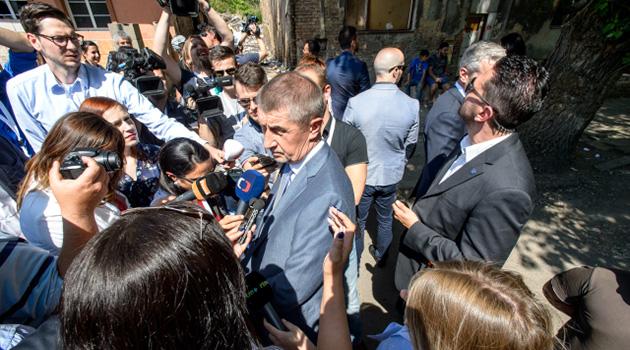Czech Labor Minister says lower housing benefits will drive down rents, experts say it will destroy social housing policy

The proposed reduction to housing benefits for families with four or more members and for persons in residential hotels, according to the acting Czech Labor Minister Němcová (ANO) will lead to a decline in the overpriced rents being charged where people in need live. Receiving less state support will reportedly not deteriorate or endanger the situations of people in need.
Němcová made the statement to the Czech News Agency (ČTK) last week. According to her, the proposed changes to welfare are meant to prevent the abuse of state money by dishonest landlords who charge disproportionate rents.
Experts in social issues have harshly criticized the proposals and called them a dangerous gamble. In their view, the number of homeless people could double after the benefits are reduced.
The Labor Ministry is proposing the changes in its amendments to the law on social support and to the law on aid to those in material distress. In its background documents from the Government, the ministry states that the legislation is meant to prevent the “overuse of welfare” to cover housing costs.
The acting Government, in its program, counts on revising the welfare system. “These changes come from a specific investigation in the regions into these problematic localities and from an analysis of who is drawing these benefits today,” the minister told ČTK.
The Labor Minister also said she did not want to wait for the law on social housing to be adopted, or for the planned combination of the two different kinds of housing benefits into one to take effect. The “housing bonus” and the “housing contribution” are based on the normative standard costs for adequate housing, which are determined annually by the Government according to the size of an accommodation unit, the number of persons in the household, and prices.
As of next year, the normative standard used to calculate housing benefits for families with four or more members should be reduced for rental housing by between CZK 2 600 and CZK 3 100 (EUR 100 – 120), while the normative standard for those who who own property, including cooperatively, should be reduced by approximately CZK 2 360 [EUR 90]. People living in residential hotels would have benefits calculated on the basis of half of the normative instead of 80 % of the normative standard, as is currently the case.
“We have not reduced the housing contribution for large families, we have capped it per household… For the housing bonus per apartment unit there is no longer the exception that CZK 9 800 [EUR 380] can be drawn for a one-room unit in a residential hotel, we have capped the price per single room,” the minister told the wire service.
After the price cap, a family with four and more members will be able to receive a housing contribution that would, at the very most, be equivalent to the contribution to a three-member household. In the residential hotels bonuses are being drawn, according to the Government materials, by approximately 13 500 people in the country, 3 300 of whom are children and 640 of whom are senior citizens.
The normative for establishing the bonus would be reduced for a four-member family, depending on the size of the accommodation, by roughly CZK 5 000 – CZK 7 500 [EUR 195 – 290], and for a senior citizen living alone by between CZK 1 660 to CZK 2 360 [EUR 65 – 90]. According to Němcová, the recipients of welfare pay landlords rents that are far above market rates.
The acting minister believes that after this change, property owners will have to lower rents if they want to stay in business. “That [reducing welfare] will not endanger [tenants’] situations. The apartment units where people live who receive welfare are not suitable for renting to other citizens. They are very often in poor repair,” she said.
The changes are meant to impact primarily dishonest landlords, according to the minister. “The law is designed with the awareness that the owners of buildings and residential hotels whom we refer to as ‘traffickers in poverty’ will just see their profits in the many hundreds of percent decline. Tenants should not be affected by it in the final result,” she said.
The Platform for Social Housing has called the proposals “the destruction of the main pillar” of social housing policy, which it considers welfare to currently be, given that there are no social apartment units available. “The predictable impact of the changes proposed would be roughly a doubling of the number of homeless people,” the Platform said.
Many people in the Czech Republic are unable to afford rent today, according to the Platform. They work under the table in the informal economy and frequently pay for their housing from the part of their incomes that should be spent on food.
The planned amendments are also being criticized by the Institute for Social Inclusion. “First it is necessary to legislatively resolve social housing and to introduce it in practice – i.e., how much of what will be provided to whom by whom in cases of homelessness – and only at that point will it be possible to restrict the only thing that is currently keeping impoverished people and medium-income households off the street,” said the head of the Institute, Martin Šimáček.
He pointed out that the amendments were written in the course of just a couple of weeks without analyzing what their impacts will be. “This cannot be serious work, but it does seem like a shot in the dark and an attempt to demonstrate that the Government is ‘hard at work’. They are not, they’re gambling,” he said.
Šimáček called the ministry’s approach an “absolute failure to comprehend the role of the state in housing support.” The Czech National Disability Council is also taking a stance against cutting housing benefits.
“We have a problem with these proposals and our standpoint on them is a distinctly negative one. We have filed our essential comments about them,” the head of the Council, Václav Krása, told ČTK.
